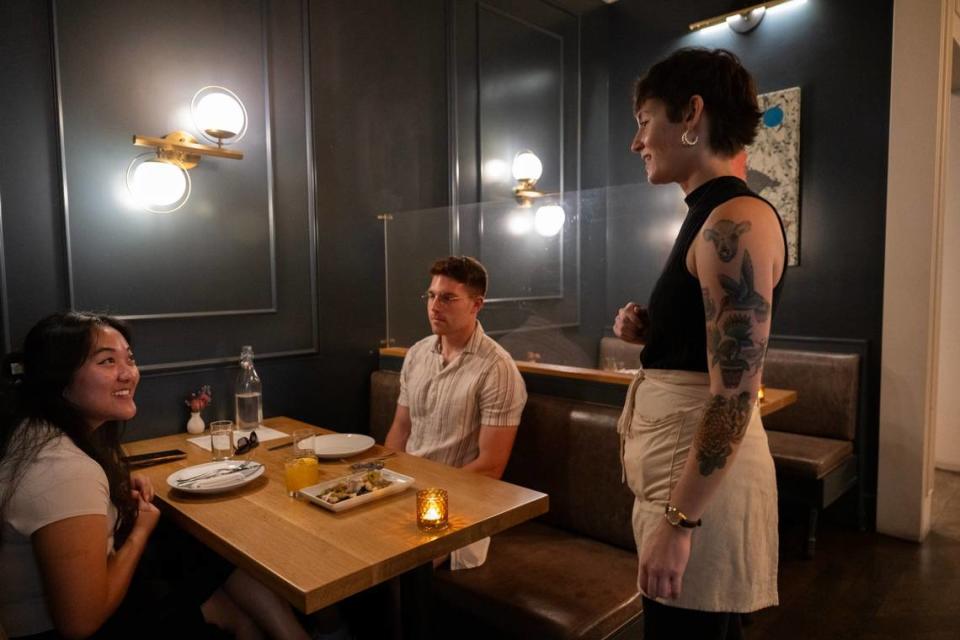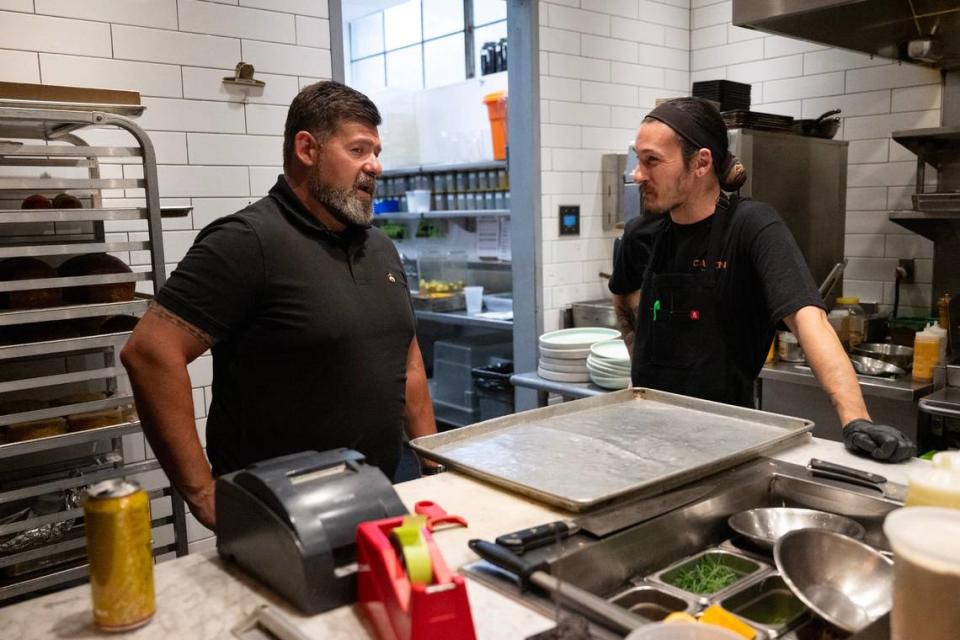These Sacramento restaurants might have to stop adding bill surcharges. They’re not happy
- Oops!Something went wrong.Please try again later.
Customers at Hawks Public House can acquire a wealth of information from the menu. It tells them that cherries on top of the mortadella tartines come from Saeng’s Strawberry Stand in Granite Bay and the blue cheese used in the Cobb salad is from Shaft’s Cheese & Co. in Roseville.
It also lists the name of every back-of-house staffer who prepares those dishes, down to the last line cook. Glance at the small print toward the bottom of the menu, and you’ll learn that those staffers get extra compensation from a 3% surcharge passed on to guests, an inflation-combating initiative that could soon be made illegal.
Surcharges have become increasingly commonplace at California restaurants over the past decade, a way for businesses to raise wages and weather inflation without directly hiking menu prices. However, they’ll be banned under a new state law taking effect on July 1 — unless the bill’s original author can push through an 11th-hour amendment.
Customers can opt out of Hawks Public House’s 3% fee, but only about one party per month actually does so, general manager Cody Goessman said. Service charges applied to the restaurant’s banquets, private events and catering orders are more mandatory.
If surcharges vanish, Goessman said, so will Hawks Public House’s business plan.
“It has a ripple effect that really affects the business at its core. Everything would have to change,” Goessman said.
Was California’s surcharge bill intended for restaurants?
SB 478, also known as the Consumer Legal Remedies Act, aimed to strike out “junk fees” when it was signed into law in May. Authored by Sen. Bill Dodd, D-Napa, it bans businesses such as hotels, ticket vendors and short-term rentals from listing one price and charging another due to resort fees, processing charges or other reasons aside from tax.
A few weeks after SB 478 passed, California Attorney General Rob Bonta clarified that restaurants would be included in that group of businesses. That drew the alarm and ire of the California Restaurant Association, which worked with Dodd and other legislators to author an urgency measure (SB 1524) on June 6 that would let restaurants continue administering surcharges provided that they’re clearly listed.
Hidden fees are unpopular, but most restaurants with surcharges already advertise theirs on the menus. That should be enough, said Clay Nutting, who co-owns East Sacramento small plates concept Canon and West Sacramento cafe Franquette.
“I don’t think anyone likes surprise charges, so I certainly understand where this might have come from. But I also think the key is about transparency, and most good actors in any industry are completely transparent about their services charges or service fees or mandatory gratuities,” Nutting said. “The business should be able to operate in the way that they fit as long as they’re communicating that with their guests.”

Dodd, whose district stretches from the North Bay into Davis and Woodland, said he never intended the original bill to apply to restaurants. The State Assembly unanimously approved SB 1524 on Monday, setting it up for a Senate concurrence vote to approve final changes before it heads to Gov. Gavin Newsom’s desk. Whether Newsom will sign it before SB 478 takes effect on July 1 is unknown.
“All along when I was promoting my bill on this (SB 478), I just never really believed that restaurants should be included in it,” Dodd said. “People understand that restaurants tip. There are some communities where they’re tipping because a city has put in a health fee or some of these other things.”
How do surcharges appear on the bills of Sacramento restaurants?
Surcharges are perhaps most common at fine dining restaurants: prix-fixe meals at Localis, The Kitchen and Allora all come with at least 22% in automatic gratuity and/or other fees.
It’s not just high-end restaurants, though. Tahoe Park brunch favorite Bacon & Butter and sister East Sacramento restaurant The Green Room each had 5% operations fees for about four months last year.
A night out might come with unexpected charges, too. Darling Aviary, a rooftop bar with burgers near Downtown Commons, recently made waves on Sacramento’s Reddit page for a 20% auto-gratuity that kicks in once the bill reaches $100. Dive Bar customers get a $1 “entertainment fee” along with a $10 cover charge when the bar’s mermaids are swimming. Midtown sausage-and-beer icon LowBrau includes a 15% gratuity for customers enjoying sit-down dinners as well as those shouting their orders to busy bartenders on hectic weekend nights.
Midtown vegan restaurant Veg Cafe pays cooks in part through a 5% back-of-house fee on dine-in orders. Prior to the fee’s implementation in 2021, servers tipped out the kitchen staff based on a percentage of their sales, said chef/owner Calvin Born, who worked his way up Veg Cafe’s front- and back-of-house before buying into it in 2022.
Under Veg’s old system, a $100 tab for a table netted the kitchen staff $5 whether the customer left a 15% or 30% tip for their server. That made sense in theory, Born said: tips are meant to incentivize and reward good service, so the server should keep the additional money if customers are feeling extra generous.
Yet some customers inevitably refused to tip out of principle. The kitchen staff would still get their $5 based on the total bill, but since it came out of the server’s tip pool, that person would actually lose money for having waited on the table.
“I can’t speak for everyone, but for Veg it isn’t a scheme to make more money, but actually a byproduct of America’s tipping culture,” Born wrote in a text message.
Veg Cafe will nix its kitchen equity fee with the upcoming roll-out of its summer menu, Born said. Canon and Franquette, on the other hand, will keep their surcharges — 4% fees that cover employee healthcare and additional back-of-house pay — in place if Newsom signs SB 1524.
Canon, like many restaurants, also charges parties of six or more a 20% gratuity. It’s not clear whether that would be allowed if SB 1524 isn’t passed, Dodd said.
Consistent service charges give restaurants bandwidth to “smooth out the flight,” as operating costs rise, Nutting said. Even a restaurant like Canon, which changes its menu frequently, is loathe to implement elastic prices that jumping to reflect the cost of goods and miscellaneous fees.

“The restaurant industry is already notoriously known for very razor-thin margins, if any at all, and you certainly read in the paper about closures happening week-in and week-out,” Nutting said. “Business owners have an obligation to try and find ways to keep their business solvent, to keep their employees employed, to be able to pay their bills and make a living. Sometimes you have to make business decisions that, you know, are in the best interest of the business.”
Even if Dodd’s urgency measure does pass, hotels, ticket sellers and short-term rentals such as Airbnb will still have to list their actual prices in California starting July 1. Many of them currently administer surcharges well beyond 3-5% tack-ons: a $100 ticket for Tim McGraw’s upcoming Golden 1 Center concert, for example, costs an additional $23.20 in fees.
“It’s an imperfect system and I understand it’s a hot button topic right now,” Born said in a text message. “But I don’t understand why people are so upset about small businesses doing what larger companies like Ticketmaster have been doing for years.”

